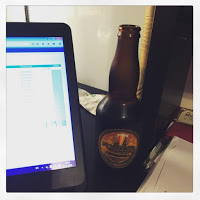Q&A: Proposal and literature review
 I’ve been slacking a bit in replying your questions that you sent me – sorry folks! Between running the defenses series and the “how I work” series and regular work, things have been a bit hectic.
I’ve been slacking a bit in replying your questions that you sent me – sorry folks! Between running the defenses series and the “how I work” series and regular work, things have been a bit hectic.
But here I am to reply another question from a reader:
Hello,
I enjoyed reading your articles.
Would you kindly suggest any useful books on how to write a good proposal?
Also, would you be able to advise anything on literature review? Which sites are best and what technique are you using?
Thank you in advance.
Let’s break this question down into different parts.
1. Information on how to write a good proposal
My PhD program did not require a proposal. Essentially, in the Netherlands, you get four years to do research and produce a thesis. No coursework, no comprehensive exams, no proposal, nothing at all.
I’ve replied a question on how to make your presentation for a proposal in the past. An excellent overview of the elements you should discuss in your proposal is this source from Columbia.
But let’s break it down into the components you need into your proposal:
– literature review: more about that in a minute, but you should show in your proposal that you have gained an understanding of your field, so that you can pinpoint the lack of knowledge on the topic you want to work on.
– problem description: what problem are going to study? Why is it important? What do we know so far (form your literature review), and where is your work going to take us?
– research question: This topic is actually the core of your proposal, and will be the core of your research. Always know very well what your research question is, so that you can return to the question regularly and check if you still are carrying out research related to your question, or if you got off on tangents.
– methods: How are you going to tackle the problem? Experiments? Computer modeling? Theoretical derivations? Again, show that you know the existing literature, and how you get hints from there on what would be the way to go.
– backup plan: if your methods give bad results, what are you going to change? Do you have a plan B?
– planning: How are you going to make sure you graduate on time? Do you have a planning? Do you have sufficient buffer in your planning in case something goes wrong?
2. Literature review
Love it or hate it, the literature review is an essential element of scholarship. I really like and recommend you to take the Literature Review Bootcamp – I’ve gone through the material and I think it covers everything you need to know about the literature review from A to Z.
On this blog, you can also find some posts of myself about the literature review. There is a guest post with three super important tips for your literature review, my method on how to grind through a large amount of literature , and a question from a reader about the literature review that I answered. If you’re interested in my method of archiving, you can find a post here. Nowadays, I do mostly use Endnote, and I still have a lot of the paper copies of my PhD days in a box in my mom’s house on the other side of the Atlantic.
My main advice for the literature review is: follow your instinct and read a lot. You’ll find that point when you know the field, when you read a paper, and suddenly you are nodding in agreement, because you’ve seen similar things a number of times before. Or you might be shaking your head in disapproval, thinking that the authors missed out some information from a paper you read before. When you reach this level of interaction with the literature, you have internalized the information. At that point, you don’t need to do a major reading effort anymore.
I’m framing this as “not having to do a major reading effort”, as in: not having to sit down for days on end with endless files on your digital reader or piles of papers in front of you. You do still need to follow up with the literature. Here you can find a post I wrote about keeping up with the output. You can also start to read at different levels. Through ResearchGate and Academia.edu you might want to follow people who publish in your field, so you get notifications about their new publications.
A helpful trick to learn as well is speed reading. For us non-native English speakers that requires a certain level of the language before you can dive into speed-reading. It took me quite some years to get to that point – so don’t panic if it doesn’t come to you naturally.
I hope this gives you some ideas for your proposal.


Thank you for posting these tips Eva! I am in the process of writing a proposal and it takes a lot of time and effort! To be organized and work a little bit on it every day. I enjoy your blog a lot! Andrea
Thanks, and good luck!